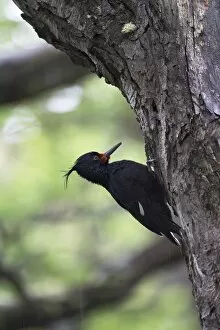Magellanic Woodpecker Collection
The Magellanic woodpecker (Campephilus magellanicus) is a stunning bird species found in the Santa Cruz region of Patagonia, Argentina, South America
All Professionally Made to Order for Quick Shipping
The Magellanic woodpecker (Campephilus magellanicus) is a stunning bird species found in the Santa Cruz region of Patagonia, Argentina, South America. With its vibrant plumage and impressive size, it is truly a sight to behold. Nahuel Huapi National Park in Rio is one of the prime locations to spot these magnificent creatures. Their distinctive drumming echoes through the park as they search for insects and larvae within tree trunks. The rhythmic beats resonate throughout the forest, announcing their presence. Both male and female Magellanic woodpeckers exhibit remarkable features. The females are adorned with beautiful black feathers while sporting a striking red crest on top of their heads. These elegant ladies can be seen gracefully hopping from branch to branch in search of food. In contrast, the males boast an even more eye-catching appearance. Their jet-black bodies are accentuated by bold white stripes across their wings and back. When spotted against the backdrop of Torres del Paine National Park, their contrasting colors create a mesmerizing spectacle that leaves observers in awe. These woodpeckers play an essential role in maintaining ecosystem balance by controlling insect populations and creating nesting cavities for other birds, and are true architects of nature's design. Visitors lucky enough to witness these incredible birds up close will surely appreciate their beauty and gracefulness amidst Patagonia's breathtaking landscapes. As they soar through the air or cling onto tree trunks with powerful claws, it becomes evident why they hold such significance within this unique habitat. The Magellanic woodpecker serves as a symbol of resilience and adaptability within its natural environment—a reminder that even amidst challenging conditions, life finds a way to thrive.


